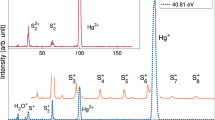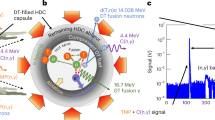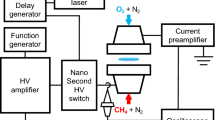Abstract
AN A.E.I. MS2 mass spectrometer has been modified to sample ions from flames burning at atmospheric pressure. The spectrometer is of the 90° sector magnet type. The flame ions after traversing the magnetic field are collected on an electrode plate subsequent to passing through a twelve-stage Allen type electron multiplier. The system enables ion currents at the collector as small as 10−15 amp. to be measured.
This is a preview of subscription content, access via your institution
Access options
Subscribe to this journal
Receive 51 print issues and online access
$199.00 per year
only $3.90 per issue
Buy this article
- Purchase on Springer Link
- Instant access to full article PDF
Prices may be subject to local taxes which are calculated during checkout
Similar content being viewed by others
References
Knewstubb, P. F., and Sugden, T. M., Proc. Roy. Soc., A255, 520 (1960).
Green, J. A., and Sugden, T. M., Ninth Symp. Combustion, 607 (Cornell University, 1963).
Calcote, H. F., Ionisation in High Temperature Gases, 107 (Academic Press, New York and London, 1963).
Van Tiggelen, A., Ionisation in High Temperature Gases, 165 (Academic Press, New York and London, 1963).
Author information
Authors and Affiliations
Rights and permissions
About this article
Cite this article
COOPER, A., LITTLEWOOD, K. & WILSON, J. Some Observations on Ions of Low Mass Number in Hydrocarbon Flames. Nature 210, 946–947 (1966). https://doi.org/10.1038/210946a0
Issue Date:
DOI: https://doi.org/10.1038/210946a0
This article is cited by
-
Ions of Low Mass Number in Hydrocarbon Flames
Nature (1966)
Comments
By submitting a comment you agree to abide by our Terms and Community Guidelines. If you find something abusive or that does not comply with our terms or guidelines please flag it as inappropriate.



